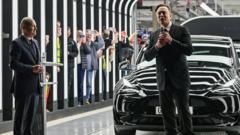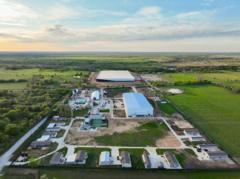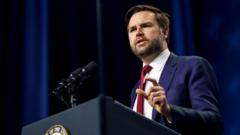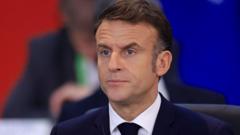As Elon Musk intensifies his political interventions in Europe, leaders voice concern over the billionaire's influence, particularly in light of impending elections.
### European Leaders Push Back Against Musk's Political Commentary

### European Leaders Push Back Against Musk's Political Commentary
**Musk's social media engagement with European politics sparks backlash amid rising tensions.**
In recent days, European political leaders have expressed growing alarm over Elon Musk's active involvement in their political landscapes, especially during a critical time leading up to Germany's federal elections on 23 February. Chancellor Olaf Scholz of Germany has been a target of Musk's criticisms, having been labeled an "incompetent fool" by the tech mogul on social media. The situation escalated as Musk plans to host a discussion with Alice Weidel, leader of the far-right Alternative for Germany (AfD), which currently ranks second in the polls.
Scholz advised his colleagues to remain calm and "not feed the troll," emphasizing the importance of ignoring Musk's provocations. However, not all European leaders share this indifferent stance. French President Emmanuel Macron raised eyebrows, incredulous that the owner of a major social network would engage so openly in electoral matters, particularly to support a burgeoning international reactionary movement.
Norwegian Prime Minister Jonas Gahr Store echoed these sentiments, expressing concern over Musk's level of involvement in other nations' domestic affairs. Spain's government has also voiced apprehensions, urging social media platforms like X to maintain neutrality and avoid interference in political matters. Musk has recently spotlighted various issues, including crime statistics in Spain and Norway, and has controversially linked attacks in Germany to uncontrolled immigration levels.
UK Prime Minister Keir Starmer criticized Musk's spreading of misinformation, applicable to his commentary about grooming gangs and child sexual exploitation, although he did not directly name Musk. Interestingly, some leaders, like Italy's Giorgia Meloni, have aligned themselves closely with Musk, calling him a "genius" and an "extraordinary innovator."
The backlash comes primarily from Germany, where Musk's remarks have been viewed as direct meddling in a sensitive political environment. Musk notably referred to the AfD as the "last spark of hope" for Germany, which has drawn ire given the party's associations with extremism. German security services have classified the AfD as right-wing extremist, raising further questions about Musk's intentions.
Green party spokesperson Robert Habeck strongly warned Musk to "hands off our democracy," while others speculate that Musk's support for the AfD could be tied to broader economic interests, potentially undermining Germany's stability for U.S. benefit.
The European Commission's Thierry Breton flagged concerns over potential advantages the AfD could gain from Musk's livestream chat with Weidel, although he acknowledged that current EU Digital Services rules do not prohibit such interactions. Meanwhile, Musk's business dealings in Italy, including negotiations with the government for satellite communications, have sparked further unease. Critics argue that entrusting sensitive services to Musk, particularly given his proactive support for the European far-right, poses risks.
As politicians across Europe brace for the impact of Musk's expanding influence, the intersection of technology and politics is drawing intensified scrutiny and cautionary deliberation from global leaders.



















